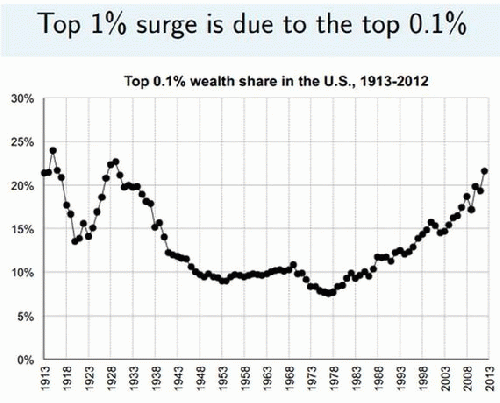Reprinted from www.huffingtonpost.com
The American people have spoken. But what did we really say about inequality?
At first glance, it seems that extreme inequality mattered little to the majority of voters who put pro-business candidates into office. After all, the Republicans, along with far too many Democrats, are certain to cater to their Wall Street/CEO donors. Do Americans really want an ever rising gap between the super-rich and the rest of us?
A important study ("How Much (More) Should CEOs Make? A Universal Desire for More Equal Pay") by Sorapop Kiatpongsan and Michael I. Norton provides insight on why Americans aren't more upset about rising inequality: It shows we are clueless about how bad it really is. Their analysis of a 2009 international survey of 55,187 people from 40 countries, found that when it comes to understanding the severity of inequality, we're the most clueless of all.
Americans are virtually blind to the growing gap between CEO pay and the pay of the average worker. As the chart below shows that gap has increased dramatically. In 1965, for every dollar earned by the average worker, CEOs earned 20 dollars. By 2012, that gap mushroomed to 354 to one.
But, when asked in the survey, Americans grossly underestimated this gap. Instead of 354 to 1, the Americans in representative survey think it is only 30 to 1. When asked what the ideal pay gap should be, Americans say that a fair gap would be about 7 to 1.
More amazing still, the survey results, combined for all countries, show that the misconception of inequality doesn't significantly vary by age, gender, income, political leanings or education.
To see if these finding also hold for the U.S., I waded into the database: Does political affiliation and education impact how the 1,581 Americans in the survey estimated the wage gap? (The data comes from the International Social Survey Programme: Social Inequality IV - ISSP 2009 on the website Gesis. )
As the chart above shows, "Strong Democrats" estimated that the actual ratio between a CEO of a large corporation and an unskilled factory worker was about 36 to 1. "Strong Republicans" said it was 40 to 1. A difference without a distinction.
When it comes to offering opinions about what the wage gap should be, the Strong Democrats thought 5 to 1 was about right, while the Strong Republicans thought it should be about 12 to 1. The two political extremes obviously are much closer to each other than to the current reality of 354 to 1.
Does education make a difference?
The data also allowed us to compare those who didn't finish high school
with those with graduate degrees. Low and behold both groups again were
closer to each other, and again were wildly off the mark. Those who
didn't finish school thought the actual gap was 60 to 1 while those with
graduate degrees thought it was about 40 to 1.
Those who didn't complete high school thought the ideal pay gap should be about 5 to 1, while those with graduate degrees offered 12 to 1, ratios were identical to those offered by the Strong Democrats and Republicans.
When it comes to our ignorance of the pay gap, there are no blue states, no red states -- only misinformed states of mind. We're the Know-Nothings of inequality.
Why are we so blind to inequality?
Most of us have no idea that our golden land of opportunity is the
runaway leader among developed nations when it comes to inequality, (see
chart below.) This dubious distinction runs counter to American Dream
that we've been indoctrinated with since birth. As a result, we
reflexively think that America is epitome of democracy -- the fairest
most just and most upwardly mobile country in history. That makes it
hard for us to account for why we are more unequal than all these other
countries. So, I suspect many of us just tune out the data. It's too
jarring to the deep-seated doctrines that comprise our national
identity.
(Note: You can view every article as one long page if you sign up as an Advocate Member, or higher).








